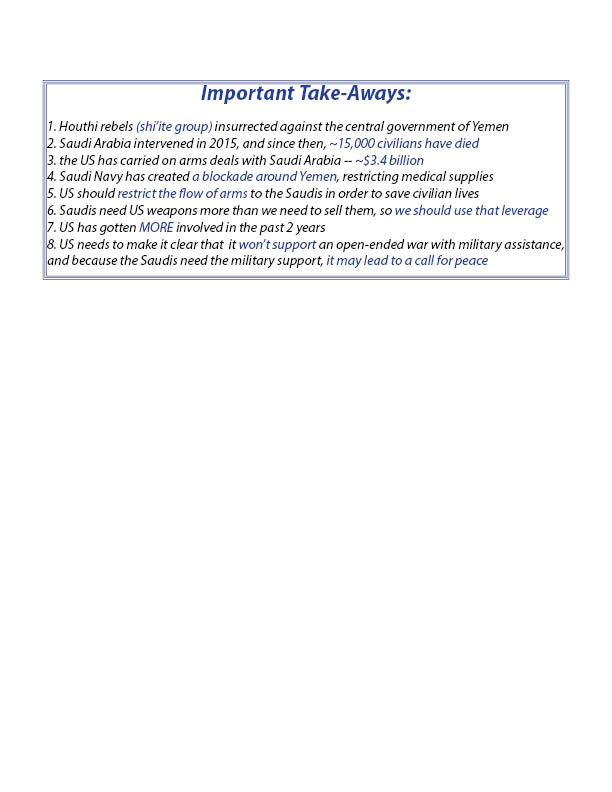Humanitarian Crisis in Yemen Dragged on For Too Long
March 7, 2019
The long-standing animosity between the Sunni and Shia sects of Islam has persisted over thousands of years. In Yemen, this has manifested in an especially violent way. A Shi’ite rebel group called the Houthis has been fighting a war against the Yemeni central government since the 1990s. Saudi Arabia, a Sunni regime, became involved in this conflict because of their allegiance to the Sunni central government of Yemen. In March 2015, an international coalition led by Saudi Arabia launched air strikes against the Houthi armed group in Yemen, sparking a full-blown armed conflict.
The biggest negative impact of this war has been on the civilians, who have been caught in the crosshairs for nearly 4 years now. More than 15,000 civilians have died, and many more suffer each day, to the point where 22.2 million Yemenis rely almost entirely on foreign humanitarian aid. The US alone has donated nearly 87 million (as of April 2018).
However, the US has carried on arms deals with Saudi Arabia. In 2017 alone, the country has bought roughly 3.4 billion in arms deals from the US (NPR). The 87 million in humanitarian aid pales in comparison to this number, and it seems rather counterintuitive that the US continues to provide the weapons used in the air strikes that tear apart the same citizens’ lives that they have given so much financial and humanitarian aid to improve.
Additionally, Saudi Arabia has been stationing naval forces around Yemeni waters since 2015, creating a blockade that has hindered Yemen’s ability to receive shipments of medical supplies, food, and other necessary resources by 58%. What many don’t know is that this blockade wouldn’t exist without US support. In fact, a Marine Corps Assessment in 2018 showed that the Royal Saudi Naval Force is dependent on US support for the technology for fleet maintenance and logistics.
The humanitarian situation in Yemen is in shambles, and the political world has turned its back for far too long. Regardless of the millions in humanitarian aid the US has given to better the man-made crisis, it is virtually pointless if it doesn’t actually politically intervene.
If the US wants to facilitate real change in Saudi Arabia’s destructive actions in Yemen, they need to restrict the flow of arms. An embargo is necessary and would be relatively easy, since the US has the upper hand in the two countries’ arms trade relationship.
The fact of the matter is that the Saudis need US weapons more than we need to sell to them, so the we need to exploit this control we have over them and act accordingly. We need to use the leverage we have to come to a political settlement with the Saudi central government that mandates that they consider the civilian lives to the utmost degree before any military action they take in Yemen.
Despite the leverage we hold, the Trump administration hasn’t taken these steps or anything close to them. In fact, it has done just the opposite.
In the past few years, US involvement in the war has escalated. Not only has the administration reversed a decision by the Obama administration to halt the sale of more than $500 million in laser-guided bombs and other munitions to the Saudi military, but it has also emboldened Saudi military leaders in their destructive actions in Yemen.
For instance, in 2017 the administration, with basically no public discussion or discourse, dispatched special forces to the Saudi-Yemen border to help the Saudi military destroy Houthi missile sites.
This operation contradicted several previous statements from White House officials that the US’s only military assistance to the Saudi Arabian military campaign in Yemen is aircraft refueling, logistics, and general intelligence. It raises the concern of how the US may actually be indirectly contributing to the humanitarian crisis.
Furthermore, forces loyal to Saudi Arabia recently tried to force Houthi rebels out of Hodeidah port, which is instrumental in getting humanitarian aid into Yemen. Because so many civilians’ lives depend on humanitarian aid, UN officials warn that if this conflict were to be prolonged, it could lead to the deaths of 250,000 people–not from combat, but from mass starvation.
In September of 2018, Secretary of State Mike Pompeo assured Congress that the Saudi military forces were trying to minimize civilian casualties and ensure that the incoming humanitarian aid reached Yemeni civilians in need of it. However, according to a recent UN export and various Human Rights Watch investigations, this was not the case.
Though that particular port conflict was temporarily halted in Nov. 2018, the threat remains constant, since the Saudi Arabian military has said they will resume the attack if they feel threatened.
Because of its support from the Trump administration, the Saudis have little to no incentive to call off this conflict to prevent the scores of civilian deaths that would result. It is imperative that the US make it clear that it won’t support an open-ended war in Yemen with military assistance. Given an ultimatum of this general premise, Saudi Arabia and its allies would be more inclined to initiate a call for peace, since they wouldn’t be able to keep a war going without the US’s support.
What is happening in Yemen right now is a humanitarian catastrophe, and no matter how much the US needs Saudi Arabia as a strategic political ally, there is no excuse for its indirect support of what is happening right now. The crisis is man-made, and the US is indisputably fueling the disaster. No matter how many millions the US donates in humanitarian aid, the lives of Yemeni citizens will continue to be ripped apart daily if the US remains inert in real political intervention. If we don’t use the leverage we have over Saudi Arabia to stop this crisis and implore the reduction of civilian losses, then we are not only fueling the crisis, but encouraging it.



